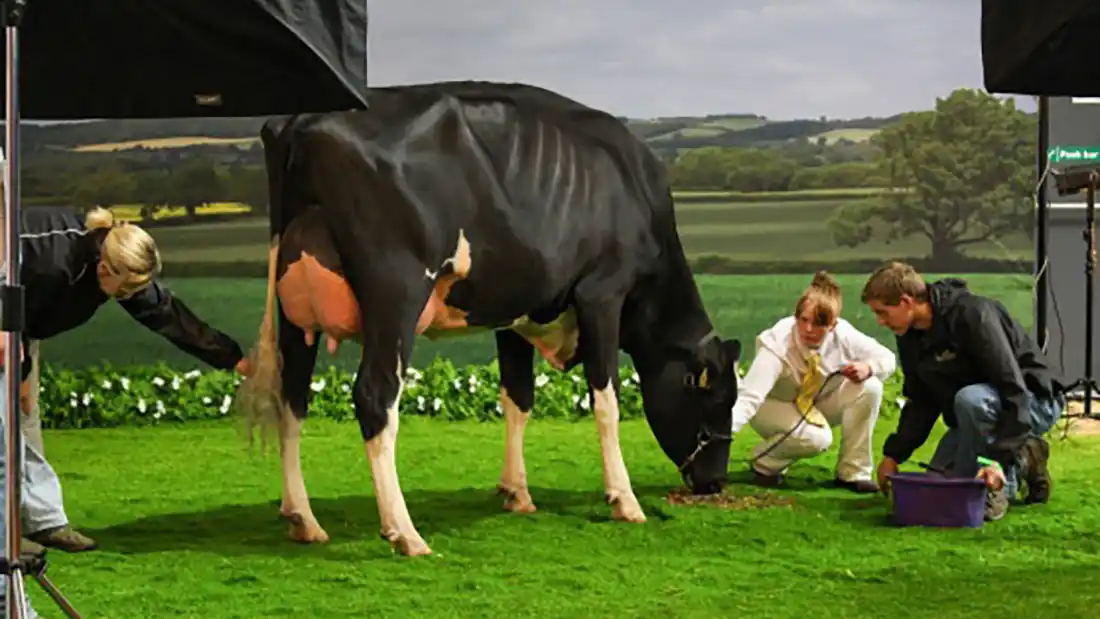What’s wrong with organic meat, dairy and eggs?

In a nutshell…
- Organic farming uses more land and still has a worse environmental impact than plant-based equivalents!
- Organic farms don’t mass-feed antibiotics, meaning these ‘high-welfare’ farms have comparable or even higher rates of disease and infection than others, due to under-reporting.
- Organically farmed animals are still slaughtered at a fraction of their lifespan – totally unnecessarily, as plant-based alternatives are always available!
What is organic?
‘Organic’ is one of those words that can make anything sound good. Organic fruit. Organic meat, fish, dairy and eggs. Not many people actually know what organic means in the context of agriculture, however, this doesn’t stop plenty of people from asserting that they only ever buy organic animal products and that this, somehow, means the animals didn’t suffer!
Depending on the precise body and country that certifies a particular product as organic, the meaning can vary widely. In the UK, for example, organic generally means that animals are not mass-fed antibiotics, given growth hormones or any other chemicals.
Depending on the species, there is also a restriction on performing painful mutilations, keeping animals in cages or crates (eg organically farmed pigs cannot be kept in farrowing crates), and a minimum outdoor grazing period (eg organic cows being grazed outdoors for 180 days of the year).
This is doubtless better for day-to-day animal welfare than, say, intensive factory farming. Most practices would be. But is it really ethical?
Organic uses more land
Firstly, organic practices are far more land intensive. This is not just due to the land needed to graze animals, but also due to the large amount of land needed to grow food for them without using growth-promoting, high-nitrogen artificial fertilisers. This has drastic implications for biodiversity, though the situation is complex.
For instance, the lack of insecticides and pesticides used in organic farming is a good thing for biodiversity compared to inorganic farming that relies heavily on such damaging compounds.
However, we also know that farming meat, fish, dairy and eggs is the number one leading cause of wildlife loss around the world, and merely avoiding pesticides and insecticides is a very small band-aid on a much larger problem.
If we were to switch to an entirely veganic farming system tomorrow, we would reduce the total amount of land needed for agriculture around the world by up to three-quarters. This means the remaining land that would be freed up globally could be dedicated to rewilding, replanting forests, jungles and grasslands, absorbing carbon from the atmosphere and rehoming endangered species, of which there are around a million. These endangered species would do much better in their natural habitat rather than on a farm, no matter how organic.
Antibiotics: infectious swings and resistant roundabouts
Secondly, antibiotics usage is very much a Catch-22 situation. We feed around three-quarters of the world’s antibiotics to farmed animals – a very dangerous fact as the routine use of antibiotics in farmed animals has led to the rapid increase in antibiotic-resistant strains of bacteria. Drug-resistant diseases already cause at least 700,000 deaths globally a year but a government-commissioned 2016 review on antimicrobial resistance (AMR) estimates that by 2050, as many as 10 million people could die each year as a result of AMR. In other words, antibiotic resistance will kill more people than cancer in less than 30 years. The World Health Organisation (WHO) says it is one of the main threats to modern medicine, with growing numbers of infections – such as pneumonia, tuberculosis, gonorrhoea and salmonellosis – becoming harder to treat.
Because humans commodify animals to the extent that we do, the primary is incentive is to produce as many animal products as cheaply as possible. While sick animals require antibiotics, we also see healthy animals being treated for ‘disease prevention’. This routine use enables farmed animals to be kept in poor, filthy conditions where disease spreads easily. Up to a third of dairy cows in the UK are suffering from mastitis at any given moment, for example. When animals are not routinely fed antibiotics, these diseases may become even more rife. Consequently, organic dairy milk may contain a higher load of pus cells (euphemistically branded ‘somatic cells’ by the industry) for this very reason: many of the dairy cows are constantly suffering infection!
Organically-farmed babies are still killed!
Finally, if we are really concerned with animal welfare, we ought not to be killing animals that do not want or need to die. This is the simplest possible argument against organic farming on welfare grounds: it is never ‘humane’ to unnecessarily kill perfectly healthy babies to satisfy our taste buds when plenty of tasty, nutritious plant-based products are available!
Conclusion
Whether they are raised on organic farms or in factory farms, choosing to kill these animals, often via gassing, electrocution, shooting a bolt into their skull or cutting their throat, is hardly a kind, humane or generous decision to make – especially when the hundreds of easy, delicious and healthy plant-based recipes at www.veganrecipeclub.com are freely available instead!




